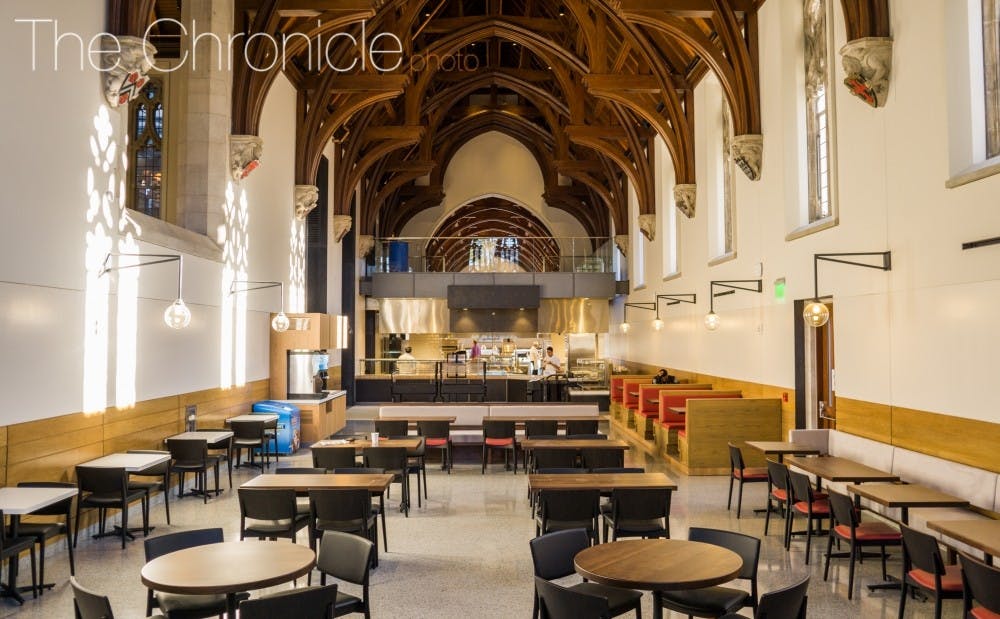After receiving the first place ranking for The Daily Meal’s "Best Colleges for Food in America" in 2016, Duke Dining now has another award under its belt—this time for sustainability practices.
The National Association of College and University Food Services presents sustainability awards to dining programs of member colleges and universities. In 2017, there were three categories—schools could participate in only one category, with each having a bronze, a silver and a gold designation. Duke Dining submitted an entry for consideration in the category for procurement practices—how and where an institution gets its food—and was awarded a gold distinction.
“According to the judging criteria, this award means that of all the entries submitted, Duke Dining’s sustainable procurement program was recognized as the most creative, innovative and effective,” wrote Marcus Carson, sustainability and quality assurance manager for Duke Dining, in an email.
Carson added that these qualities were achieved by considering the full spectrum of food and sustainability issues in the procurement program. While many schools set a mileage limit to buy “local,” Carson wrote, Duke Dining goes several steps further.
Its method is known as the “triple bottom line” approach. Triple bottom line considers ecological health, social equity and economic viability in possible food sources. Carson wrote that through triple bottom line, Duke Dining assesses the full environmental, social and economic costs and benefits of the food that it serves.
“In practice, that means Duke Dining’s sustainable procurement program prioritizes the sourcing of foods that are not only local, but also organic (USDA Certified or organic-practice), humanely raised, never treated with antibiotics or hormones, produced using fair labor practice, sustainably-fished and/or third-party certified,” Carson wrote.
He added that Duke Dining seeks to develop long-term, strategic partnerships with producers that value sustainability. Some of these partnerships include producers that are already a part of the University community.
“Duke Dining regularly works with the Duke Campus Farm, Funny Girl Farm and Endless Sun Produce to provide produce for meals at the Marketplace,” Carson wrote. “All of these growers operate right in Durham, NC.”
Although its gold award was in procurement practices, Duke Dining also looks toward improving its sustainability in other areas such as food waste. This concern led Duke Dining to partner with the student-led Food Recovery Network in order to donate unserved food to local shelters.
“With regards to food recovery (also known as food “waste”), Duke Dining is working to begin donating unserved, ready-to-eat food in the Fall of 2017,” Carson wrote.
Food waste from Duke Dining can also become compost. Carson wrote that during the 2016-2017 year, an average of 36 tons of organic waste was diverted from the landfill and instead composted into nutrient soil.
Additionally, compostable containers are used in locations where composting is readily accessible, and Marketplace is 100 percent tray-less, further reducing food waste.
“[Tray-less dining] reduces food waste because trays, as a product of their convenience, tends to encourage diners to fill the entire tray with stacks of plates of food, and in most cases, they don't eat everything they've taken and end up throwing it out,” Carson wrote. “Over time, the environmental—and economic—savings of tray-less dining add up!”
He explained although sustainability practices can cost more, the program embraces the extra expense.
"Duke Dining recognizes and embraces the fact that responsibly, sustainably produced food does not externalize its costs onto the environment or vulnerable communities, and as a result, it will often be more expensive than industrially produced foods," Carson wrote.
Get The Chronicle straight to your inbox
Signup for our weekly newsletter. Cancel at any time.

